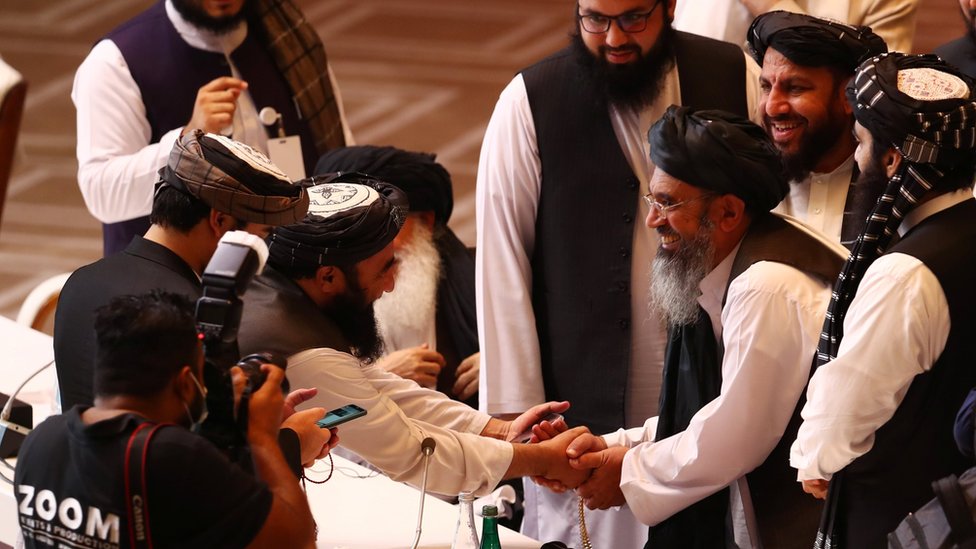Confidence-Inspring Negotiations Between Taliban and Afghanistan
Confidence-Inspiring Negotiations Between Taliban and Afghanistan
 |
| Afghan President Ashraf Ghani, Mike Pompeo (Andrew Harnik/AP) |
"The Taliban is not clearly committed to searching for a real peace -- as distinguished from trying to use the peace process to achieve its own ends."Anthony Cordesman, former director intelligence assessment, U.S.Defense Department"This opportunity must not be squandered. Immense sacrifice and investment by the United States, our partners, and the people of Afghanistan have made this moment of hope possible.""I urge the negotiators to demonstrate the pragmatism, restraint, and flexibility this process will require to succeed. The people of Afghanistan and the international community will be watching closely."U.S. Secretary of State Mike Pompeo"Eventually we as Afghans should be prepared for any eventuality.""There is no doubt that there will be consequences by the decisions made by [our] international partners all together [to withdraw their troops].""But it is our responsibility to work together and find a way to live in peace.""It will happen one day, of course, and Afghanistan should be able to stand on its own feet, but if it is premature, it will have its consequences."Abdullah Abdullah, Chairman of Afghanistan's High Council for National Reconciliation
 |
| A Taliban spokesman told the BBC it represented "good progress" that both sides were talking rather than fighting Reuters |
It
has been nineteen years since the launch of Operation Enduring Freedom
representing the Anglo-American air campaign meant to target the Taliban
and al-Qaeda in Afghanistan. The Taliban, then in control of
Afghanistan, hosted al-Qaeda and refused to surrender Osama bin Laden to
the United States following the 9/11 attacks on New York and
Washington. Soldiers from over 50 countries that had signed on to the
mission led by the UN and by NATO military formulations were involved.
Nineteen
years ago this very week the country was at war with itself after
twenty years of warlord conflicts, famine and the carpet-bombing of the
Soviets followed by Taliban rule. In that time over a million Afghans
had been killed, a full third of the Afghan population were refugees
living outside the country, and those that stayed were on the cusp of
famine. Over a million landmines were scattered on the landscape. The
Taliban government had virtually enslaved the women of Afghanistan to
their Islamist vision of women as chattel.
 |
| Afghan Taliban militants celebrate the peace deal with the U.S. |
The
Taliban takeover of Afghanistan was not internationally recognized as
legitimate; it was a scab on a bleeding sore of a country incapable of
fighting for itself. Pakistan had its designs on Afghanistan, helping to
create and to support the Taliban, viewing them as indispensable to
their intention to see Afghanistan as a country in disarray, and to
ensure that India had no influence in the embattled country. Not only
was the Taliban able to find haven in Pakistan when they were ousted by
Operating Enduring Freedom, so too was al-Qaeda and bin Laden.
The
international community is over-wearied with its commitment to seeing
Afghanistan become a fully sovereign nation. It is certainly not the
same country it was nineteen years earlier. Still in a state of misrule
and poverty, there is quality of life; it now has civic infrastructure,
and aspires to democratic governance, its women are able to take part in
life as equal partners in government, policing, politics, education and
business. Their worst nightmare is a Taliban return to its former
governing position which would mean a reversion to Islamist sharia
traditions.
Even
as the Taliban and the government of Afghanistan are speaking peace to
one another in Qatar, introduced to the necessity of bargaining with one
another for a peace settlement through the determined initiative of the
U.S. government anxious to withdraw all its troops from the country,
the Taliban have continued their bloody, violent assaults on targeted
areas, including government offices and diplomatic missions in the
supposedly most secure areas of Kabul.
 |
| Firefighters spray water at the site of an explosion targeting the convoy of Afghanistan's Vice-President Amrullah Saleh in Kabul. (AFP/Getty Images) |
According
to the Asia Foundation's latest public opinion poll in Afghanistan,
88.7 percent of respondents agreed they supported the U.S.-orchestrated
negotiations, "somewhat", while those who feel some manner of
reconciliation with the Taliban is possible however, drops to 64
percent, 58 percent among women. Strong majorities (78 percent to 87 percent)
count women's rights, equality, freedom of the press and the current
constitution among areas that are not up for discussion; post 9/11
achievements not to be negotiated away.
85.1
percent of Afghans have no sympathy for the Taliban according to the
survey by the Asia Foundation, and while 13.4 percent indicate some
measure of sympathy, 28.6 percent of them have no idea why they might
feel that way. Several other agencies engage in multi-year polling
across Afghanistan beyond the Asia Foundation, and among ordinary
Afghans, women in particular, support for the NATO countries' military
efforts remains high.
A
suicide attack on a government compound in Nangarhar province last
weekend left thirteen people dead. In the first three months after the
U.S. February pact with the Taliban, Afghanistan's National Directorate
of Security tallied 3,800 Taliban attacks, which resulted in 420 deaths.
That same directorate noted that the Taliban maintains ties with
al-Qaeda, Lashkar-e-Taiba and other terrorist organizations.
 |
| The US-led intervention and NATO troops added another chapter to Afghanistan's history of conflict and war |
Labels: Afghanistan, Operation Enduring Freedom, Peace Negotiations, Taliban, United States

<< Home